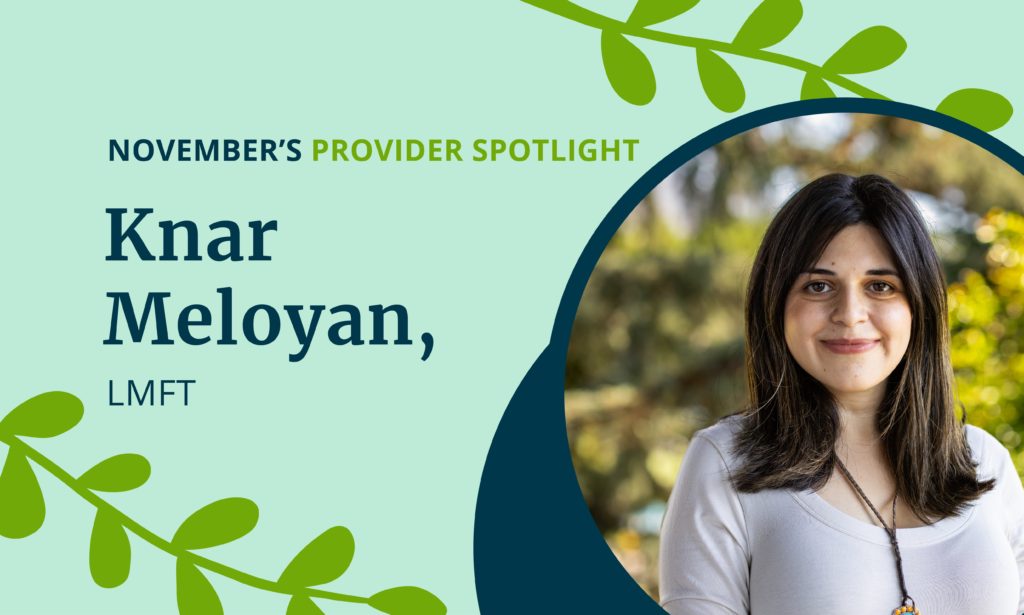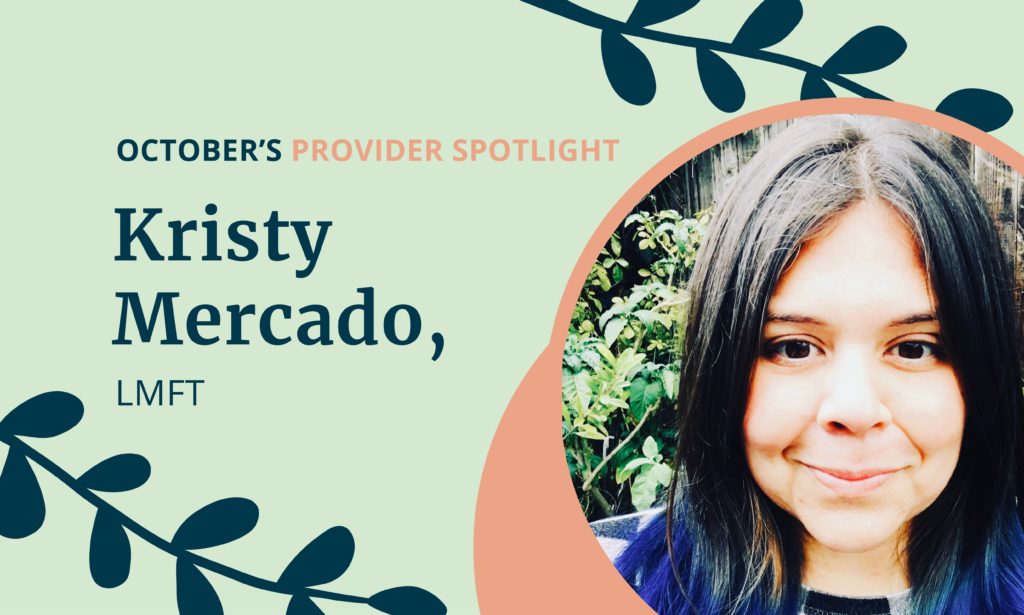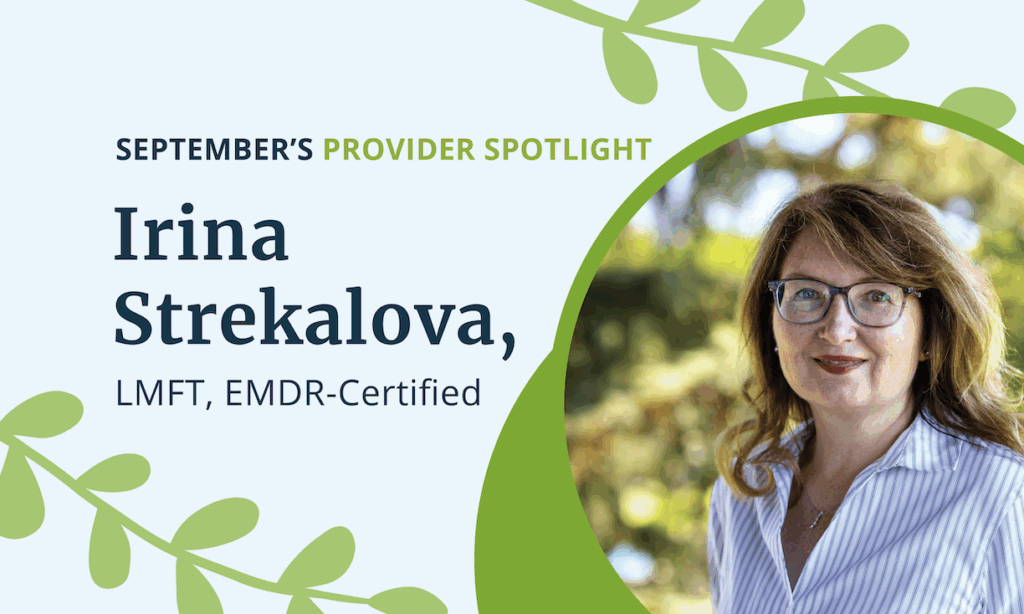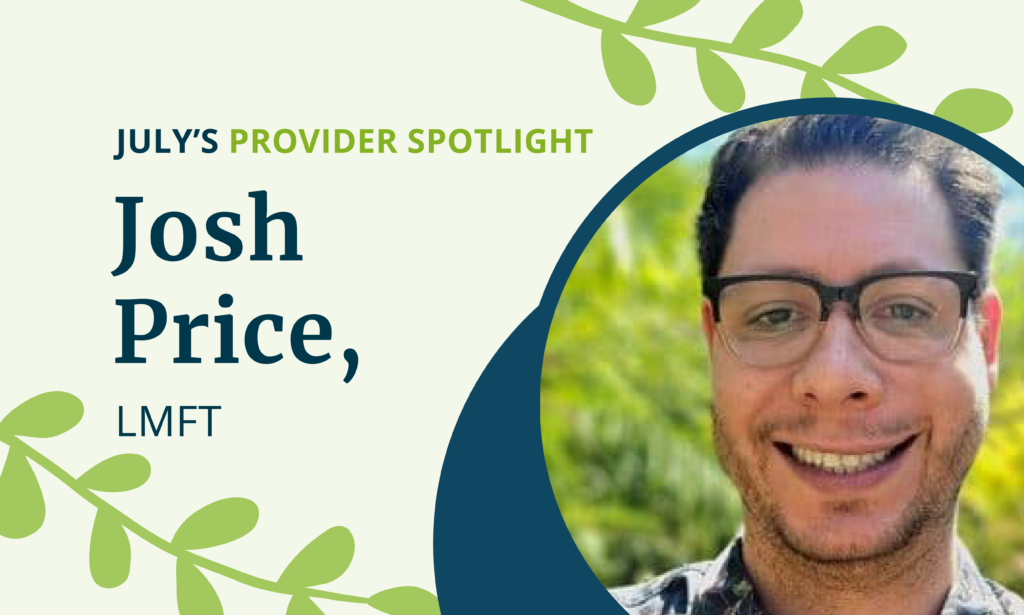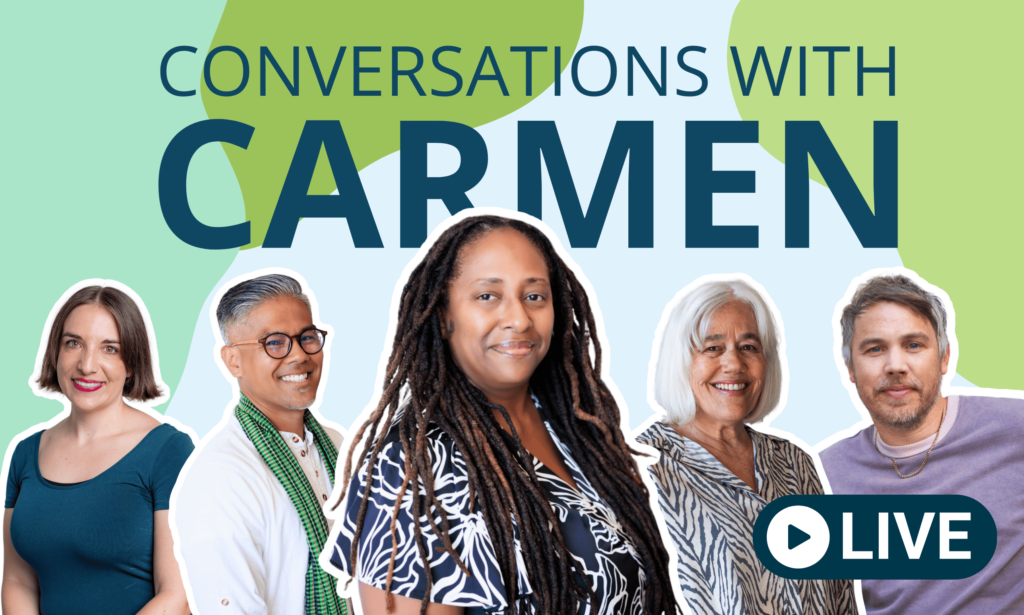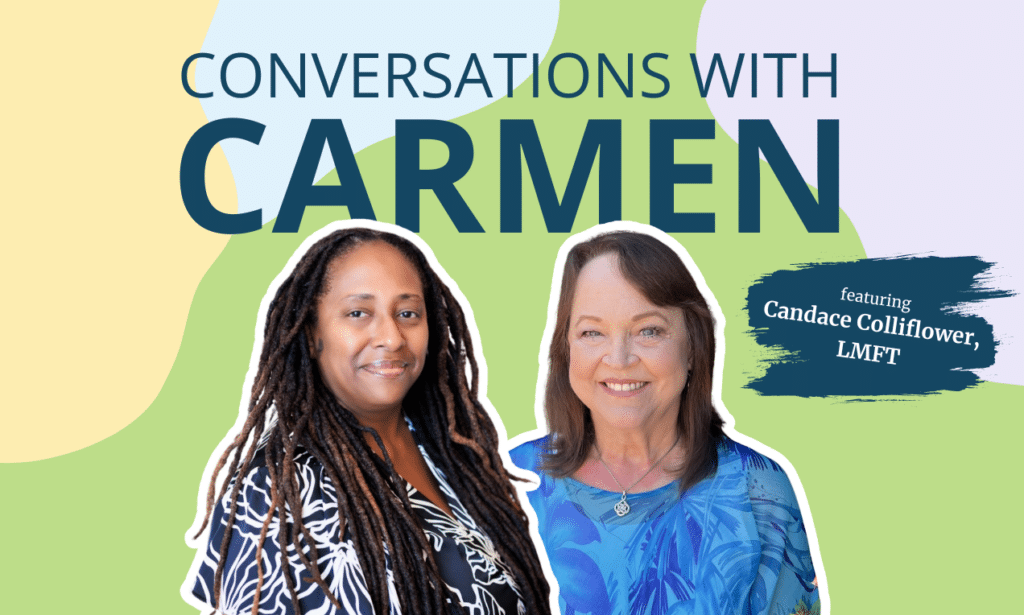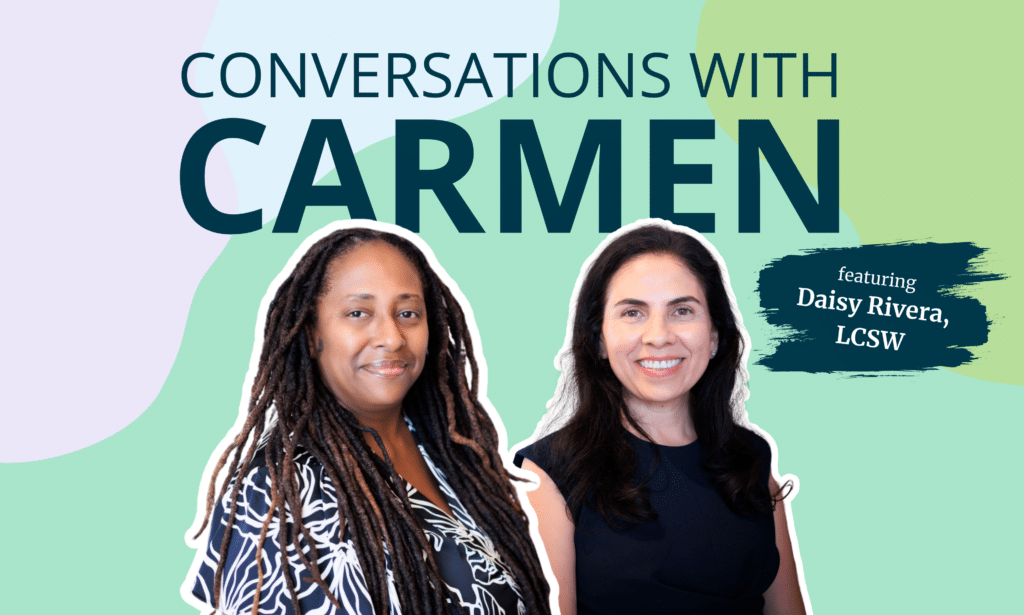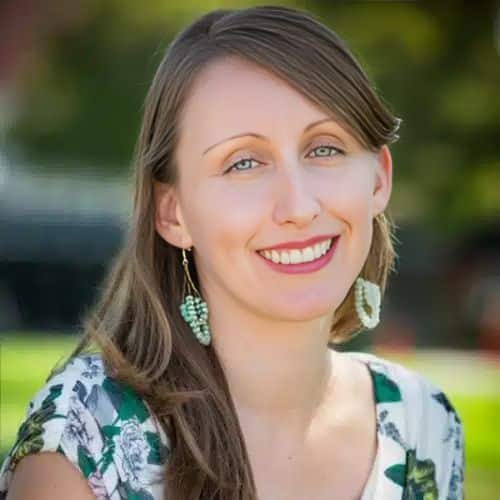
Every month we highlight a provider as our Provider Spotlight. This month’s Provider Spotlight was Jennifer Pruitt, PsyD. Each Provider Spotlight is interviewed by Dr. Carmen Majied for a segment called Conversations with Carmen.
In this segment, Carmen and Jennifer discuss Jennifer’s journey through life and how she arrived at Private Practice. Watch the video to hear more from Jennifer about her practice and how she has achieved her goals.
You shared that you are a native Southern Californian. What do you appreciate or enjoy most about California? What makes this home for you?
I was born and raised in Southern California, so, it definitely is home for me. I appreciate that California offers diversity in cultures, people, and experiences. Of course, who can beat California weather? But most importantly, my family is in California and that is a big part of why California is home.
You shared that you are the first person in your family to attend (and graduate from) college. Why is this accomplishment so meaningful to you?
This is an accomplishment that I am very proud of because I believe it helped encourage the belief that college is an option and is achievable. I started exposing my niece to colleges and encouraging my niece at a young age and she has since graduated from college. I believe the next generations in my family now consider and believe that higher education is attainable.
You mentioned that you have a multicultural background. Can you please share what those specific cultures are? Did cultural expectations play a part in your upbringing? If so, how?
My Dad is Caucasian American and my Mom is Latina (Mexican-American). I was raised to embrace my cultural identity. I grew up celebrating the traditions of my Mom’s family and our heritage. It is important for me to acknowledge both.
Growing up, you consistently had your sights set on attending college. Who and/or what helped to place that particular personal goal on your radar? Was there ever a time when the prospect of attending college didn’t seem feasible or realistic?
Growing up, I always knew that I wanted to attend college. My parents were a major influence and encouraged me and my siblings to pursue higher education. My parents did not have the opportunity to attend college and wanted us to believe that it was possible. My parents understood hard work and wanted us to have as many opportunities as possible and did not want us to struggle. I always loved school and learning and was a good student from a very young age. I was excited about the prospect of attending college. When applying for college, I worried about the financial aspect of funding a college education but my parents committed to helping in any way possible.
Before focusing focusing on psychology in college, your initial plan was to go the pre-med route (and pursue a specialty in pediatrics). However, after taking a few psychology and sociology courses you decided to pivot your college major to psychology. What were your most notable takeaways from that transition period?
During that transition period, I discovered a passion for psychology and connected with the fact that I could still help others but it didn’t have to be through attending medical school. I enjoyed learning about human behavior and I loved my classes. As I reflect, it solidifies the importance of exploring your interests in college so that you can find what your passionate about and the career you will find fulfilling. College is a place for growth, exploration, and discovering your identity and goals for the future.
You shared that you worked as a Foster Care Social Worker for a number of years prior to pursuing your doctorate degree. Did you enjoy the nature of the work? What did the experience reveal to you about yourself?
I worked as a Foster Care Social Worker for several years after graduating from my Masters program. I learned a lot during those years of work about the foster care system. I had no idea about the foster care system and the experiences of children in the foster care system prior to that work. The work was challenging in many ways but I enjoyed working with the children and foster families that I built relationships with throughout the years.
During that experience, I saw the effects of early childhood trauma and loss. My work in foster care taught me the importance of being adaptable and I gained experience and confidence in building rapport with diverse groups of individuals. I learned to set firm boundaries. I also feel like I became more confident and assertive during this time. I experienced gratitude for my upbringing and support system.
While pursuing your doctorate degree you worked full-time and conducted MAT assessments for certain clients. Can you please speak to what MAT is and why the assessments are clinically relevant and informative?
MAT stands for Multidisciplinary Assessment Team. I completed MAT assessments through my work with a community mental health agency. As a MAT assessor, I was assigned cases to complete MAT assessments for children who were detained by DCFS for the first time. The MAT assessments entailed interviewing the child, the child’s current caregiver (family kinship placement, foster parent) as well as the child’s biological parents. As a MAT Assessor, I would identify the needs of the child and family and assist with linkage to services.
As a dedicated mentor, you previously provided mentoring to first generation Latina college students through Latina’s Juntas. Can you
please share a little about that experience? Were you able to relate in any way to the students you mentored? In what way(s)?
While I was completing an internship at Cal State Dominguez Hills Student Health and Psychological Services, my clinical supervisor at the time, Dr. Denna Sanchez, introduced me to Latinas Juntas. Dr. Sanchez and Dr. Rosas-Baines organized Latinas Juntas to promote connections between Latinx students and faculty and staff. The annual event was designed to provide mentorship and provide support to Latina first generation college students. I related to the students who attended because I was once a Latina first generation college student attending a University and trying to learn and navigate the college system.
As a high school student going through the college application process I was trying to learn about registration, financial aid, and the college experience. When I began attending USC as a college freshman, I was learning about the college experience, registration, financial aid, and working on identifying a support network on campus. I was able to connect with other Latina students on campus at USC. Now, there is information and knowledge that I can share with others.
How did your pre-doctoral mentoring role prepare you for the experience of providing clinical supervision and mentorship to your associates who are currently working towards licensure?
Participating in Latinas Juntas with my clinical supervisor created a model of a positive and empowering mentor. The experience allowed me to connect with other women, hear their stories, and understand the importance of considering cultural factors and the unique individual factors that influence an individual’s path and journey.
You shared that you are an advocate of mental health awareness. As previous Chair of the Pasadena Mental Health Advisory Committee, you helped to shed light on the importance of mental health awareness in the community. How did you spearhead this important and extremely relevant undertaking?
I started as a member of the Pasadena Mental Health Advisory Committee and then served as Chair. The committee’s mission was to bridge gaps in knowledge and services. As Chair of the Pasadena Mental Health Advisory Committee, I helped organize an annual event in May for Mental Health Awareness Month. The event brought together consumers of mental health services and providers in the community. The event consisted of breakout sessions (including a session on mindfulness and coping strategies).
The Committee also organized a resource fair to provide education and referrals for support and services in the community. Listening to the stories of individuals trying to navigate the mental health system reinforces the need to continue working towards education in the community to destigmatize mental health and continue working towards bridging gaps and providing support to those individuals and their families.
You joined the Soultenders provider network in 2012 (seeing clients on a part-time basis). And in 2013, you pivoted to full-time private practice. You also mentioned that you initially provided psychological testing during that time. What areas of testing did you specifically focus on? Do you currently offer testing services in your practice?
I began my journey into private practice working part time on weekends and evenings while working full-time at a community mental health organization. When I initially started my private practice, I provided psychological testing as well as therapy. At the present time, however, I do not provide testing services due to being busy managing other responsibilities. I previously administered cognitive testing, personality inventories, and other tests used to measure attention difficulties.
What client populations do you see in your practice? Individuals? Couples/Families? Teens? Is there a client population that you are keenly interested in working with?
In my private practice, I primarily work with individual adults and some teens. I also work with couples and families. I enjoy working with young adults who are trying to discover their path. I am also certified in TF-CBT and EMDR and have enjoyed incorporating EMDR into my practice with individuals who have experienced trauma.
As a Licensed Clinical Psychologist with a thriving private practice, you are also a member of the CEU committee at Soultenders, a Clinical Supervisor (individual and group) as well as a Provider Success Specialist for our Monrovia location. How do you navigate your various roles? In what way(s) do you derive gratification from each role?
I enjoy the fact that my career allows me to engage in a variety of roles. I feel honored to be a part of people’s journey to growth whether that be in my therapy practice or providing supervision to Associate therapists. My role as a Supervisor and Provider Success Specialist has allowed me the opportunity to help clinicians adjust to private practice and begin to understand and believe that private practice is possible and that they can maintain a successful business. I feel like each role allows me to contribute in a meaningful way and plant seeds for continued growth.
I’m aware that you have an interest in possible teaching at some point in the future. What are your specific teaching interests? Do you have additional professional/career aspirations?
I would like to teach at the college level or graduate level. I envision continuing my practice and teaching as an adjunct. I believe my knowledge and experience working in the mental health field and in clinical practice can help students understand the material and practical application of what they are learning.
What are your interests/hobbies? How do you like to spend your leisure/free time?
In my free time, I enjoy spending time with family and friends, traveling, baking, trying new cooking recipes, reading, watching movies and musicals, and watching college football.
Who does your immediate family consist of? How do you celebrate family?
My immediate family includes my husband and daughter. Family is very important in my life and my family also includes my parents, three siblings and their partners and children as well as my husband’s siblings and their partners and children. We see family often for birthdays, celebrations, and holidays. Most recently, my husband and I have been able to include my parents on family vacations. They have traveled to New York and Hawaii with us. It feels good to be able to give back to them for all of the support they provide.



